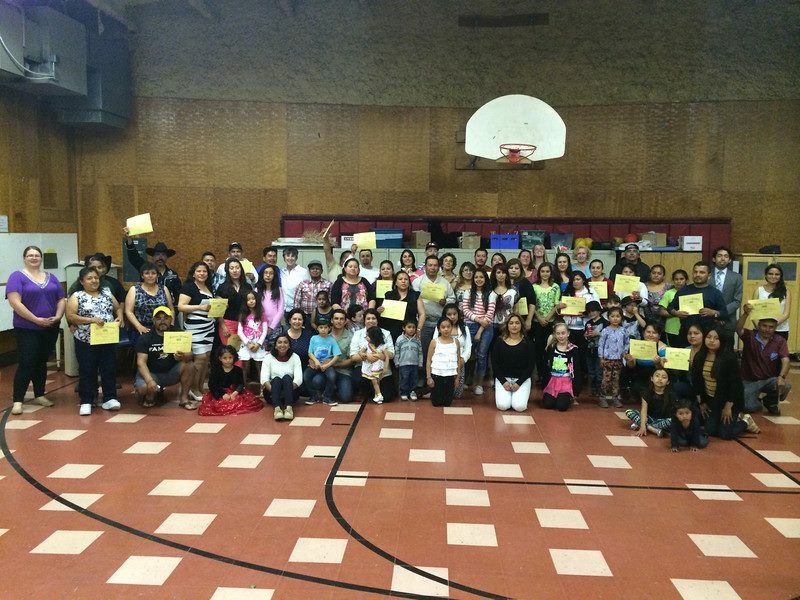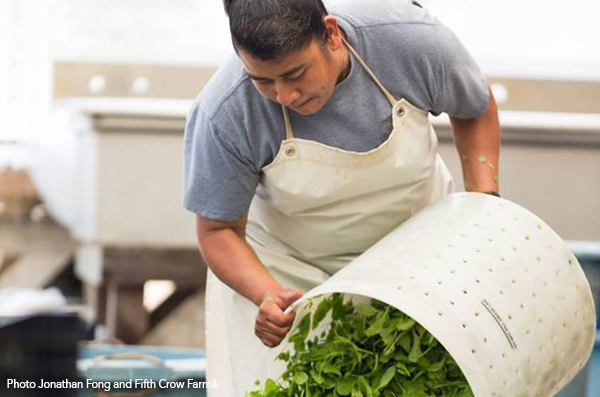The fight to learn English: Elvira’s story
Elvira Jimenez gets nervous before going to work. Bussing tables at Duarte’s Tavern isn’t what sets her heart pounding each morning, however. It’s speaking English to the customers. What if she misunderstands, and brings a patron something they don’t want?
She practices the English in her head, and practices saying each sentence aloud: “Excuse me, can I take your plate?” “More water?” “Your waitress is coming.” But sometimes, in spite of all her work, the words still come out wrong.
“I give customers water and bread. But I want to have a conversation with them. It’s hard when someone asks, ‘How is this cooked? Is this good?’ and I want to answer them,” Jimenez says. “I know a lot of words but I don’t know how to put them together.”
She’s getting there. After four years of taking ESL classes at Puente without a single break (starting as a beginner and ending up in the most advanced class, before deciding to step down a level to take it slow), Jimenez clearly understands much of the spoken English that surrounds her and can offer limited replies. It’s hard work – very hard.
“Right now it’s not comfortable. I try tell myself I can do it, but I still feel that pressure,” she says.
Learning English is one thing. Gaining confidence is another. Jimenez, a spry, earnest woman in her early thirties, started as a dishwasher at Duarte’s 12 years ago as a newcomer to Pescadero and a newlywed as well, having followed her husband to California from Mexico. Dishwashing, which is still part of her job at the restaurant, was really rough – sweaty eight-hour shifts scrubbing greasy pans, silverware and sticky soup tureens. She never wore gloves.
“When I started, the hot water burned me. My hands would start to peel,” she recalls. But at least she didn’t need to speak English – or speak much at all.
Then, a few years ago, her boss told her that she wanted Jimenez to start bussing dishes a few nights a week. Although she would earn slightly more and take home some tips, Jimenez found the prospect terrifying. But she also wanted to give it a try.
“She would tell me: ‘You can do it. You’re just going to take bread and water to them. You don’t have to be scared. We believe in you,’” Jimenez remembers.
Soon, Jimenez had English teachers everywhere. At Puente, she doubled down on her ESL work. At Duarte’s, her co-workers were told to speak to her in English only. It increased her comprehension but also her anxiety level.
Her most unexpected teacher is her 5-year-old daughter, Brianna, who comes home from school chattering away in English and then switches to Spanish so her mom and dad can speak to her. Brianna also attends Puente’s Homework Club from time to time, on evenings when her mom is taking ESL.

ESL students and teachers at graduation in the spring of 2014.
Brianna is the reason Jimenez enrolled in ESL in the first place. She wanted to be able to know what her daughter was saying, to help her with her homework, and to be a part of her world.
“It’s very important for every parent to understand their children, to speak their language,” says Jimenez. “When my child says, ‘Can you read me a book?’ I want to be able to read both in English and Spanish to her.”
It was a good decision, because Brianna is already precocious enough to read on her own, much to her mother’s delight. And Brianna has even started improving her mother’s English.
“My daughter tells me, ‘Mommy, you’re reading it wrong.’ She’ll read words to me like ‘apple,’ and if I’m not saying the words correctly she’ll correct me. She says, “Look at my lips and how I move them: apple.’”
Most Americans, especially white Americans, believe immigrants ought to “learn English.” But few Americans – just 18 percent – have themselves faced the challenge of learning a second language. That’s hard enough to do on its own, let alone while living in a foreign country, as Jimenez and an overwhelming number of other U.S. immigrants have done.
Puente offers ESL classes on Tuesdays and Thursdays from 7-9 pm taught by teachers who are committed to teaching conversation-based classes. Jimenez joins over 50 students in adult education and ESL classes who are balancing working and studying on the South Coast each week.
Jimenez has learned a lot of skills at work. When she isn’t washing dishes or bussing tables, she makes pies, prepares artichokes and cuts fish. Her husband is a cook at Duarte’s and they work opposite shifts, which is hard on their little family. But Jimenez is determined to make it work.
The English is the hardest part. Even after her shift ends, she’ll suddenly remember a word she forgot that day, and kick herself.
“At the beginning I thought, ‘I’m never going to learn this.’ But you keep coming to classes and the words tend to stick. You have to fight, day by day.”
A farm worker’s story: Lina Martinez
NOTE: Puente is writing about the lives of female farm workers for National Farmworker Awareness Week. This is the second of two stories.
Lina Martinez learned about America from the front door of a t-shirt shop in Fishermen’s Wharf. The 22-year-old crossed the border on foot, alone, in 1991 with the help of a coyote. A week later, she was in San Francisco, hawking t-shirts to tourists.

Lina Martinez with dino kale
Her job was to get people to come into the store, to sell merchandise, and to make change. But she didn’t know a word of English. And she didn’t understand U.S. currency.
“They told me: people unfold the shirts, you fold them. You’ve got to learn English. Learn the colors. You have to learn to say, ‘Three shirts for $9.99!’” recounts Martinez, laughing.
It was uncomfortable, to be sure. But Lina Martinez isn’t known for backing down.
“I called my boyfriend and said, ‘I need to learn numbers.’ I only knew 1 to 10 in English. Little by little I learned… and after a while, I could do anything!” she grins.
Martinez’s first American job at the t-shirt shop netted her $20 a day in under-the-table wages, plus $5 for lunch. She slept on a couch in the house of the man who owned the store.
Needless to say, the job didn’t last long. But by the time she found her first South Coast farm job, at Westland Nursery, and moved to Pescadero, Martinez knew her way around parts of the Bay Area. She had a cousin living on the South Coast. She knew her numbers. And her boyfriend, a man she had met in Mexico, stayed by her side.
Try to imagine moving to a new country one day without fanfare – literally, walking in with only the clothes on your back. The third child in a family of 11, Martinez knew her parents were stretched thin. She started earning money at 16, cooking for another family and cleaning houses.
One day, after a friend of hers took a chance and moved to California, Martinez decided to do the same. She left her village, Teojomulco, and made the six-hour trip to the city of Oaxaca, where she hired a coyote to get her through the border to America.
Martinez, now a 46-year-old mother of three, has a comfortable quality in her jean jacket, with a wide smile and laugh lines around the eyes. She has plenty of “long stories” to tell, and tells them with exuberance. She loves to talk about her job at Fifth Crow Farm, where she helps grow organic produce. She also plants and harvests flowers and raises grass-fed chickens. Her days are filled with broccoli, cauliflower, lettuce, fennel, onions, leeks, radishes… and chaotic chicken coops, which she cleans (she also washes their eggs).
“I like to harvest dino kale,” says Martinez, referring to a particular variety of kale. “It’s my favorite. It’s really easy to get the leaves and make bunches. I’m always saying, ‘I want to harvest the dino kale!’” She gives a merry laugh.
Transplanting crops from the greenhouse to the field is the hardest task – a slow job, which involves putting delicate starts into the ground on hands and knees. It can take hours, she says.
“It hurts your legs a lot. It’s hard. But I like it, it’s fun,” she grins.
Martinez’s positive outlook seems extraordinary considering the struggles she has faced since moving to California. Her boyfriend died a year after she started work at Westland Nursery. She had two sons, but their fathers weren’t keen to support her. She got a great job at a mushroom farm owned by the Campbell Soup Company, which paid $10.75 an hour, more than she’d ever earned up to that point. But then the mushroom farm closed down.
Another time, Martinez was cleaning cabins at a forested retreat center outside Pescadero when a table fell on her and cut her leg open. She could hardly walk for bleeding, but her bosses didn’t take her to the doctor; they just took her to their house and gave her some pain medication. She missed a lot of farm work after that. She pulls up her pant leg to show the long scar on her ankle.
Martinez has also endured four dangerous border crossings. The most recent one, about four years ago, was terribly frightening. With the border fence locked up much tighter than it used to be, Martinez had to go by sea in a motorboat crammed with 22 people. They left Tijuana at 9 p.m. and fought the waves in the dark for seven hours to get to safe landing on the California coast. People were sick and wet and scared.
“For me, that was terrible,” she laughs, shaking her head.
Every farm worker has stories of hardships. As a single mother, Martinez carried a whole other obligation. She left more than one job because it conflicted with her parenting duties. She also took on a side job cleaning the Pescadero Community Church once a week, for extra income. And somewhere in there, she managed to take ESL classes at Puente.
“My dad is really proud of me. I raised my kids by myself. There’s a saying: ‘If you’re going to do something, take the bull by the horns.’ That’s what I’ve done,” she says.
Things turned around when Martinez started working at Fifth Crow. She also met a man who fathered her youngest child, a daughter, who is now three; he lives with her and supports the family. Her two sons, 16 and 13, both want to go to college.
Martinez now has legal status to live and work in the U.S., having been granted a visa. Later this year she will apply for permanent residency.
If you had told her, at 22, that her future would unfold the way it has, Martinez would have laughed at you.
“I never did think my life would be like this. But I’ve been able to do a lot of things,” she says. “The hard knocks are really what make you stronger.”
Please consider supporting our local farm workers with a gift to Puente to help us meet their needs. Click here for more information. You can also take action on behalf of farm workers by clicking here.




